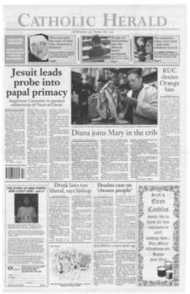Page 4, 12th December 1997
Page 4

Report an error
Noticed an error on this page?If you've noticed an error in this article please click here to report it.
Tags
Share
Related articles
At Vatican Ii, The Church Jumped Away From 19th-century...
Infallible How Can You Tell? And What The Cardinal Said.
Beyond Doubt, Humanae Vitae Was Infallible
Newman's View On Infallibility
Defining Conscience
MANY AUTHORITIES can be presented to Fr K Casey (letters,
28 November)to show that Humanae Vitae was not an infallible definition, as he asserts, the foremost being Pope Paul VI himself.
Immediately after announcing his decision (1968) His Holiness authorised Mgr Lambruschini to tell a press conference that the encyclical was not infallible. Apart from that not-unimportant factor, the letter does not have other appropriate marks for a definition, neither has it been received by the Church as a whole.
Of the 68 members of the pontifical commission between 1964-66, only the tiny minority of four were not in favour of a change in teaching. Paul VI's decision was not collegial, and despite its personal authority, clearly is reformable.
The minority, led by Cardinal Ottaviani, persuaded the Pope that a change would damage the authority of the teaching office, so that a man known for his uncertainties played safe — as he thought. (Pope John had earlier used the Shakespearean metaphor "Amletico" [Hamlet] to describe his successor.) The paradoxical result has been that, as in the case of Galilieo, and as Cardinal Suenens warned, the Church's teaching authority has lost credibility — unhappily also in other matters which loyal Christians wish to support — and we complain about women's ordination being an obstacle to unity!
John Pugh, Egham, Surrey
FR K CASEY wonders how Catholics can read Humanae Vitae and not recognise it to be the infallible truth. He has clearly forgotten that the Conciliar Fathers, in defining the doctrine of infallibility in 1870, after tremendous heartsearching, introduced an "historic preamble" which said "For the Holy Spirit was not promised to the successors of Peter, that by his revelation they might make known new doctrine; but that by his assistance they might inviolably guard and faithfully expound the revelation delivered through the Apostles, or the deposit of faith".
This was carried by an overwherning majority of the bishops present., I feel sure that the teaching in Humanae Vitae must be classed as new doctrine as it is not, to my knowledge, included in any of the letters of Ss Paul, Peter, John, James or Jude, nor the Gospels or revelation. Therefore it is quite understandable that catholics might look upon it with some doubts as to its binding truth.
G E Oldroyd, Heckrnondwike, W Yorks LIKE FR CASEY, I cannot understand how anyone can claim that Humanae Vitae does not fulfil the requirements for infallibility, but I would suggest that anyone who has any doubts should read Pius XI's Casti Conubi. K P Platt Sanderstead, Surrey
ONIN AN "erroneous" conscience could reject the clear teaching which Pope Paul VI gave and introduced with the statement: "...by virtue of the mandate entrusted to us by Christ..." As to when we know if a teaching is in this category, Lumen Gentium n.25 explains our obligations to follow the Pope when speaking on such serious matters and exercising the universal, day-to-day teaching with its infallibility of the ordinary Magisterium. John Hindmarsh,
Sale, Cheshire
blog comments powered by Disqus











